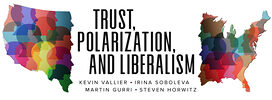Lead Essay
Kevin Vallier argues that politics should not be war, and that classical liberals should strive to be peacekeepers. He marshals evidence that high levels of social trust lead to many desirable social outcomes, and that social trust in the United States has been on the wane. At the same time, Vallier also laments the decline of classical liberalism as a force in American politics. He proposes that classical liberals can reinvigorate their movement by addressing the problem of trust—a development that will improve the political climate for everyone.
Response Essays
Steven Horwitz points out that civil society is of great value regardless of the political beliefs of those within it. Our neighbors—whom we may hate for voting for Trump, or for Biden—are the same people whom we greet and exchange kindnesses with. They are also the same people who provide us goods and services in the market—meaning that the market and civil society both stand in conflict with our harsher political impulses.
Martin Gurri places the blame for declining instutional trust squarely on how internet-mediated social interactions have fatally undermined many of our old, elite-run institutions. The problem is structural, he insists, and not the result of partisanship alone. He is doubtful that classical liberalism, however defined, can offer a workable solution.
Americans are paradoxically both highly polarized—and not all that ideologically divided, writes Irina Soboleva. Voters are intensely attached to their parties and their leaders, and, she argues, it is these institutions and leaders that have encouraged polarization. Political ignorance has exacerbated this tendency; in response, Soboleva calls for “buffer zones” of relatively nonpolitical life including but also extending beyond the market.
Coming Up
Conversation through the end of the month.

